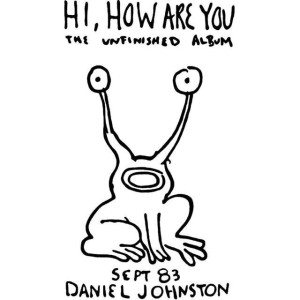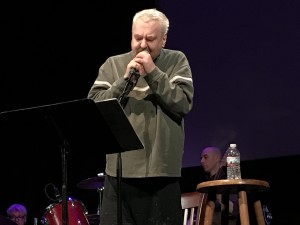 Sad to hear of the death of Daniel Johnston, the prolific and singular songwriter, whose mental difficulties seemed to bring honesty and and unfettered heartbreak to his music.
Sad to hear of the death of Daniel Johnston, the prolific and singular songwriter, whose mental difficulties seemed to bring honesty and and unfettered heartbreak to his music.
That he died at 58 may not be a shock. He looked to his death many times in his odd career, posed genuflecting at a gravestone with his name for an album he titled “The Late Great Daniel Johnston,” which included covers of his songs by fans including Tom Waits, The Flaming Lips, Beck and Bright Eyes.
His first album, in 1981, was titled “Songs of Pain.” His fourth, two years later, was “More Songs of Pain.”
Though he died of a heart attack, he nearly caused his own death earlier, most spectacularly in 1990 when he threw the keys of a private airplane his dad was flying out the window, causing a crash landing.
Johnston almost became as famous for his art — as whimsical and beguiling as some of his songs. When Kurt Cobain wore his “Hi, How Are You” T-shirt on MTV, people took notice. He had a few gallery shows of his subsequent paintings.
He had already played his final tour a couple of years ago, prefaced with the entirety of the 2005 documentary “The Devil and Daniel Johnston” and followed by a few songs in which he was backed by local heroes and those he had influenced in each town.
That meant Wilco in Chicago and Built to Spill in the Northwest, and in Washington, it brought together the rhythm section of Fugazi, together with the guitarist with whom they’d eventually form the Messethetics, Anthony Pirog and his wife Janel Leppin.
 Under-rehearsed they backed the song choices he had in his white looseleaf binder. Johnston, looking decades older in white hair and beard, bushy dark eyebrows and permanent scowl, wore a mud-splattered pants and stared only at his music stand lyrics, never looking up to see the audience.
Under-rehearsed they backed the song choices he had in his white looseleaf binder. Johnston, looking decades older in white hair and beard, bushy dark eyebrows and permanent scowl, wore a mud-splattered pants and stared only at his music stand lyrics, never looking up to see the audience.
Still, it was deeply affecting to hear his aching songs of love and disappointment, especially immediately after the film the chronicled his troubled life.
In one, “Story of an Artist,” he recounted the complaints his parents had about his artistic pursuit: “Why are you so odd? We don’t really like what you do. We don’t think anyone ever will. It’s a problem that you have, and this problem has made you ill.”
In the end he only played only 13 songs. Eight, including “Speeding Motorcycle” and “Walk the Cow” before an unnecessary break; then five more including “Don’t Let the Sun Go Down on Your Grievances.”
“We’re cutting the show early tonight,” he said finally, in his only address to the audience. “But I offer you this Christmas wish to all of you.”
And it though it wasn’t Christmas, it was only early October, the sentiment was one that defined his whole career, “True Love Finds You in the End.”
Don’t be sad, I know you will
But don’t give up until
True love will find you in the end